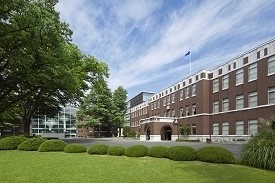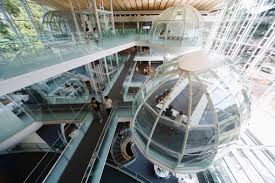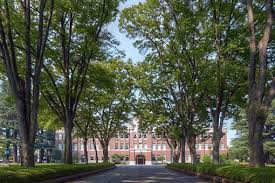The Department of Science and Engineering has 5 majors in 1 department.We will train "new science professionals" who will boldly tackle social issues by making full use of ICT utilization and expertise.
▼Data Mathematical Major
Grasp big data from mathematical science and information science to solve global problems.
Curriculum Content:
Students will learn modeling methods for better mathematical modeling of real problems, algorithms and optimization methods for solving mathematically modeled problems, and methods for analyzing and using various data from basics to applications.
Characteristics of the Curriculum:
1. Systematically learn the specialized knowledge necessary for data utilization
In order to utilize data to solve complex problems, in this major, students will systematically study the following three fields: "data science" that analyzes data and finds knowledge, "operations research" that makes optimal decisions based on data, and "algorithm" for processing of data efficiently.
2. Acquire practical skills such as programming through practical training
Solving real-world problems requires the skills to actually collect and analyze data using programming and tools. In this major, students will learn programming in Python and C ++ as a basis, and data collection and statistical analysis methods as an application through practical training.
▼ Computer Science Major
Build the future by promoting innovation in ICT and human media technologies.
Curriculum Content:
In addition to acquiring software technology for handling computers such as PCs, servers, IoT, and smartphones, students will also learn media technology that makes full use of AI to process images, videos, sounds, texts, and dialogues.
Characteristics of the Curriculum:
1. Systematically study expertise in computer science in general
Through practice from basic to application of elemental technologies that support the present and future, students will study the following fields systematically, such as software, networks, parallel / distributed, Web technology, artificial intelligence, natural language processing, and media technologies such as video / image / audio.
2. Acquire practical skills from programming to software development
Students will learn programming skills practically through typical programming languages such as Python and C ++ while improving their mathematical and logical thinking skills. Students will then learn how to build a larger software system and acquire the ability to utilize it in various industries.
▼ Mechanical Systems Major
Develop the ability to solve real-world problems with more than one correct answer.
Curriculum Content:
Students will learn about mechanical system technology that considers strength and durability, environment and comfort, and how to make systems that involve people, goods, money, information, etc. function better.
Characteristics of the Curriculum:
1. Design by considering machines and products as a system
In Mechanical Systems major, students can acquire knowledge and technology in well-balanced schedules, from basics to applications in two specialized fields, mechanical engineering and management engineering, so that students can consider the machines and products to be developed as a system and design (problem solving) by judging from a comprehensive perspective.
2. A group of subjects that can broaden students' horizons and develop problem-solving skills
By studying a combination of multiple lessons from basic to application, students can broaden their horizons and acquire a responsive way of thinking. In addition, in project-basis subjects which students need to solve problems in a group, the problem-solving ability of oneself can be cultivated.
▼ Electrical and Electronic Engineering Major
Cultivate "Wide and flexible" professionals that supports society, industry, and information infrastructure
Curriculum Content:
Students will learn the theory and practice that support society, industry, and information infrastructure through a comprehensive curriculum that organically covers electrical, electronic, mechanical control, and information processing.
Characteristics of the Curriculum:
1. Cultivate human resources who have both broad basic knowledge and deep application skills
It is no exaggeration to say that there are no products or systems that do not use electricity in recent years. In particular, technological development and product application based on electrical engineering are progressing in various fields such as household equipment and industrial equipment. Human resources who can play an active role in these fields will be trained with a wide range of basic knowledge and deep application skills.
2. Organic coverage of electrical, electronic, mechanical control, and information processing
In parallel with mathematics and programming courses, which are the foundation of natural science, the course covers electrical, electronic, and mechanical control content. By doing so, students are aimed to become an expert who is good at mathematical thinking, is proficient in modeling and programming, and has acquired advanced theoretical knowledge and practical skills.
▼ Applied Chemistry Major
Contributing to the future of people and living through academic exploration of chemistry
Curriculum Content:
With a view to developing human resources who will contribute to life innovation that opens up health and medical care and green innovation that opens up a sustainable society, students will study the academic exploration of chemistry utilizing IT and its application to society.
Characteristics of the Curriculum:
1. Life innovation that opens up health and medical care
In order to create a society in which people can live in good health, it is necessary to elucidate life science, advance food and medical technology to realize a healthy and prosperous life. Students are aiming for breakthroughs through collaboration with different fields that utilize AI as well as deepening specialized fields such as biotechnology and chemical biology.
2. Green innovation that opens up a sustainable society
In order to maintain the same life as before, it is necessary to reduce carbon dioxide emissions and obtain energy from solar and wind power. In order to expand such a new energy utilization system, we are aiming for a breakthrough in materials, catalysts, and battery technologies that also utilize AI.



